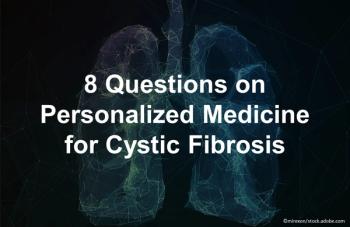
How Can Motivational Interviewing Help Improve Medication Adherence in CF?
Rates of adherence to cystic fibrosis treatment plans have been reported as low as 36%. The motivational interviewing approach could help, according to MI trainer Ellen R. Glovsky, PhD, RD, LDN.
A Q&A with Ellen R. Glovsky, PhD, RD, LDN
Non-adherence to care plans is a common issue for patients with cystic fibrosis and can result in poorer outcomes. Motivational interviewing (MI) has been found a successful method for health care providers to help patients make positive behavioral changes that support treatment adherence.
We recently spoke with Ellen R. Glovsky, PhD, RD, LDN, a clinician and MI trainer, to discuss the technique and how clinicians can implement this approach in their practice.
What is motivational interviewing?
Motivational interviewing is an approach to health behavior change, and it is an approach to the counseling method that has been proven to be the most effective way to effect change.
The basic premise:
- People are the experts in their own lives and they know best and what is going to work.
- The health care provider is the expert in what would be ideal, but motivational interviewing helps guide people, rather than telling them what to do.
Rather than my saying, “Here's what you should do,” I'm going to talk with that person about what their goals and values are regarding this behavior change and what makes them think that this behavior change would be a good idea. How do they think they might go about it?
Most of the time, people have really good ideas about how to do things if we just let them have their ideas.
We talk with people about their goals and values and help them come up with a plan to make a change, rather than tell them what to do.
I'm a guide instead of an instructor.
Next: How can MI help patients with cystic fibrosis?
How can MI potentially help patients with cystic fibrosis address reasons for non-adherence to medication?
In a MI scenario, I would talk with a patient about what's not going so well in their life regarding their cystic fibrosis. Presumably, that person is seeing a health care provider because there's a problem.
I would say: “I'm wondering what you think about using this medication or technique to solve that problem, because we found that this really does work quite well for people.”
We address it by asking what their goals and values are, and how might their life be better if they took these medicines, because we're inviting the other person to come up with their own solution based on what's important to them in their lives.
Next: Common barriers to medication nonadherence
What are some of the common barriers that people have for not wanting to take their medication?
People say they forget to take their medicine, or they say they resent having to take medicine:
“I'm upset that I have this illness to begin with and I don't want to do anything about it. I just want to pretend it's not there.”
We hear a lot, “I forget to take my medicine.” What you hope is that there are consequences to not taking the given medicine so you can help people develop the idea in conversation that taking it is better than not taking it. What are the pros and cons of taking this medicine, or not? I would ask the other person to tell me, “What’s not so good about not taking your medicine? What's not working so well?”
We try not to use the word “bad.” We try to say, “not so good.” "Bad" implies huge judgment on my part. What’s not so good when you don't take the medicine? And, what do you think will be good about taking it?
The answers to those questions are called “change talk.” That is when the other person is talking about change, and not the health care provider.
When I can stimulate change talk in my patient, that's the [patient] making the argument for, in this case, taking the medicine. If you're my patient, and I ask you, “What's good when you take it, and what's not so good when you don't take it,” the answers to those questions are almost always change talk. Unless, of course, you have someone for whom the medicine isn't working.
Next: What skills are needed to begin using MI?
What communication skills do providers need to learn to begin using MI?
Health care providers need to drop the idea that they get to tell other people what to do.
If you think about a time in your life when someone told you what to do and how you felt about it, it may not have been the most positive experience. Most of us, when we're told what to do, want to do the opposite, even if we know it's not in our best interest.
That doesn't mean there's never a place for telling patients what to do. If you're prescribing the medicine and the patient’s agreed to take it, you have to tell them how to do it. What I'm saying is when I become the lecturer, judge another person's behavior, I've lost them.
There are 2 big sets of skills that we help people develop:
1. Listening. First are listening skills, because you have to be able to listen very carefully to what people are telling you, not talk over them, not try to convince them of your position-which in this case would be to take the medicine-but listen very carefully to what they're telling you and what they mean by what they're telling you. What are the goals and values embedded in that conversation?
We train people to listen differently than they're used to listening. Usually, when people think they're listening, they're actually formulating the next thing they want to say instead of really listening. In training sessions, we start with listening skills.
2. How to stimulate "change talk." The second set in the broad category of skills people need to learn is what do you say in response to stimulate change talk, to move the conversation ahead to planning for change. But we don't jump to planning until people are on board with the idea that they're going to do this.
Next: How can MI be incorporated into practice?
How can providers implement MI in their practice? What care changes would need to be made for MI to be most effective?
The ideal way to learn MI is to do it in a hands-on workshop setting. It takes time to learn. It's not a simple thing. It sounds very simple when I explain it, but when people actually try to do it-especially people who've been trained in the “Let-me-tell-you-what-to-do” approach-they struggle with it.
Practicalities often don't allow for a workshop because I'm talking about 1 to 3 days of person-to-person training. Unfortunately, people don't have time for that anymore.
There are lots of different books to read. Two particularly good ones are,
Next: "It can appear deceptively simple."
Is there anything else you feel is important to know about MI?
I would emphasize that it takes time to learn this and that it can appear deceptively simple. It can feel, when you read about it, that you’re already doing this. The truth is that it's complex in a sort of hidden away. You don't see it at the beginning, but if you have a good coach, they can really help healthcare professionals look at what are they doing with patients, how well it is working, and what's an alternative.
I'm a big advocate of take the time to learn this because, it's worth it. There are lots of little underlying nuance behaviors that the clinician can use to enlist the other person in the conversation of deciding if and when and how they will change, but it’s the other person that gets to decide that. It's really about letting go and letting the other person make this decision.
To learn more about motivational interviewing, visit the
Rosengren, D. B. (2018).
Miller, W. R., & Rollnick, S. (2013).
Newsletter
Enhance your clinical practice with the Patient Care newsletter, offering the latest evidence-based guidelines, diagnostic insights, and treatment strategies for primary care physicians.

































































































































